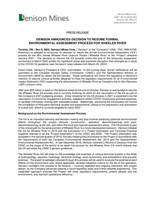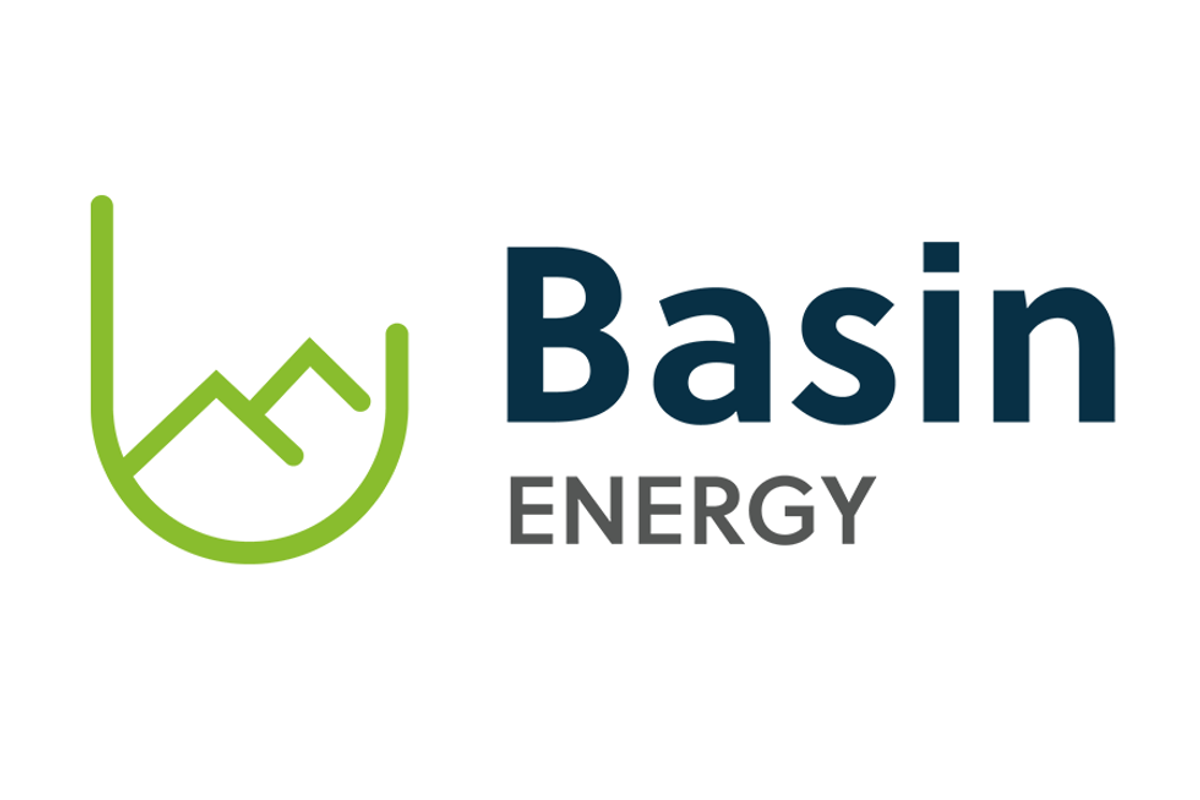Denison Mines Corp. ("Denison" or the "Company") (TSX: DML) (NYSE American: DNN) is pleased to announce its decision to restart the formal Environmental Assessment ("EA") process for the 90% owned Wheeler River Uranium Project ("Wheeler River" or the "Project") effective January 2021 . The decision to resume the EA process marks the end of the temporary suspension announced in March 2020 amidst the significant social and economic disruption that emerged as a result of the COVID-19 pandemic (see Denison's news release from March 20, 2020 ). View PDF Version .
David Cates , Denison's President & CEO, commented, "In the coming days, formal notifications will be submitted to the Canadian Nuclear Safety Commission ('CNSC') and the Saskatchewan Ministry of Environment ('MOE')to restart the EA process. These notifications will inform the regulators of Denison's intention to resume various activities designed to meet the regulatory requirements for an Environmental Impact Statement ('EIS') supporting the advancement of Wheeler River as Canada's first In-Situ Recovery ('ISR') uranium mine.
With over $29 million in cash on the balance sheet at the end of October, Denison is well funded to resume the Wheeler River EA process and is currently finalizing its plans for the resumption of the EA as part of the Company's 2021 budgeting process. A key milestone for the EA process in 2021 is expected to be the resumption of community engagement activities, adapted to reflect COVID-19 protocols and best practices, to facilitate information sharing with interested parties. Additionally, advancing the EA process will involve the completion of third-party technical studies and assessments, ahead of the preparation and submission of a draft EIS, which is currently targeted for early 2022."
Background on the Environmental Assessment Process
The EA is an important planning and decision-making tool that involves predicting potential environmental effects throughout the project lifecycle (construction, operation, decommissioning and post-decommissioning) at the site, and within the local and regional assessment areas. The EA process is part of the critical path for the advancement of Wheeler River to a future development decision. Denison initiated the EA for Wheeler River in 2019 with the submission of a Project Description and Technical Proposal (together referred to as the "Project Description") to the CNSC and MOE. The Project Description was accepted in the second quarter of 2019, formally initiating the EA process for the Project in accordance with the requirements of both the Canadian Environmental Assessment Act, 2012 and the Saskatchewan Environmental Assessment Act. In late December 2019 , Denison received a Record of Decision from the CNSC on the scope of the factors to be taken into account for the Wheeler River EA, which indicate that the EA will follow the CNSC's generic guidelines.
The Wheeler River EA will draw on the knowledge and expertise of various technical experts in the fields of hydrogeology, aquatics, hydrology, terrestrial ecology, socio economics, and atmospheric and acoustic sciences. The expert knowledge collected through this process will be used to evaluate the potential project effects on the environment and, where applicable, develop mitigation criteria for the life of the operation. Denison considers this process to be iterative – involving repeated and ongoing interaction with project design, as the Company advances towards a future feasibility study and further detailed engineering. This integrated approach ensures the Project will meet regulatory requirements, protect people and the environment, and maintain operational efficiency.
Impact on the Company's Outlook for 2020
The Company previously announced plans for 2020 in its annual Management Discussion & Analysis ("MD&A") for the year ended December 31, 2019 (the "Initial 2020 Outlook"). Those plans identified discretionary work related to the advancement of the Wheeler River EA with a total cost of approximately $7.0 million . As updated in the Company's MD&A for the quarters ended March 30, 2020 and June 30, 2020 , the Company's Outlook for 2020 was adapted in response to the COVID-19 pandemic and the decision to temporarily suspend the Wheeler River EA ("Updated 2020 Outlook"). While the Company's internal environmental and technical teams continued to advance certain scopes of work related to the EA during 2020 (see Denison's news release dated October 28, 2020 ), the Updated 2020 Outlook did not include the discretionary EA work identified in the Initial 2020 Outlook.
Now, in support of the planned resumption of the EA in 2021, the Company has approved certain discretionary scopes of work for the remainder of 2020 – each of which is designed to best position Denison to resume the EA process. The Company's latest Outlook for 2020 ("Latest 2020 Outlook") is outlined in its MD&A for the period ended September 30, 2020 and reflects these additional discretionary scopes of work as part of the $700,000 of additional evaluation expenditures outlined for Wheeler River in 2020.
The future scope and cost associated with the resumption of the EA and the associated activities for 2021 are still to be determined, and are expected to be included in the Company's future disclosure of its overall business plans for 2021, which is expected to follow the completion of the Company's annual budgeting process.
About Wheeler River
Wheeler River is the largest undeveloped uranium project in the infrastructure rich eastern portion of the Athabasca Basin region, in northern Saskatchewan – including combined Indicated Mineral Resources of 132.1 million pounds U 3 O 8 (1,809,000 tonnes at an average grade of 3.3% U 3 O 8 ), plus combined Inferred Mineral Resources of 3.0 million pounds U 3 O 8 (82,000 tonnes at an average grade of 1.7% U 3 O 8 ). The project is host to the high-grade Phoenix and Gryphon uranium deposits, discovered by Denison in 2008 and 2014, respectively, and is a joint venture between Denison (90% and operator) and JCU ( Canada ) Exploration Company Limited (10%).
A PFS was completed for Wheeler River in late 2018, considering the potential economic merit of developing the Phoenix deposit as an ISR operation and the Gryphon deposit as a conventional underground mining operation. Taken together, the project is estimated to have mine production of 109.4 million pounds U 3 O 8 over a 14-year mine life, with a base case pre-tax NPV of $1.31 billion (8% discount rate), Internal Rate of Return ("IRR") of 38.7%, and initial pre-production capital expenditures of $322.5 million . The Phoenix ISR operation is estimated to have a stand-alone base case pre-tax NPV of $930.4 million (8% discount rate), IRR of 43.3%, initial pre-production capital expenditures of $322.5 million , and industry leading average operating costs of US$3.33 /lb U 3 O 8 . The PFS is prepared on a project (100% ownership) and pre-tax basis, as each of the partners to the Wheeler River Joint Venture are subject to different tax and other obligations.
Further details regarding the PFS, including additional scientific and technical information, as well as after-tax results attributable to Denison's ownership interest, are described in greater detail in the NI 43-101 Technical Report titled "Pre-feasibility Study for the Wheeler River Uranium Project, Saskatchewan, Canada " dated October 30, 2018 with an effective date of September 24 , 2018. A copy of this report is available on Denison's website and under its profile on SEDAR at www.sedar.com and on EDGAR at www.sec.gov/edgar.shtml .
Denison suspended certain activities at Wheeler River during 2020, including the formal EA process, which is on the critical path to achieving the project development schedule outlined in the PFS. The Company is not currently able to estimate the impact to the project development schedule outlined in the PFS, and users are cautioned against relying on the estimates provided therein regarding the start of pre-production activities in 2021 and first production in 2024.
About Denison
Denison is a uranium exploration and development company with interests focused in the Athabasca Basin region of northern Saskatchewan, Canada . In addition to the Wheeler River project, Denison's Athabasca Basin exploration portfolio consists of numerous projects covering over 250,000 hectares. Denison's interests in the Athabasca Basin also include a 22.5% ownership interest in the McClean Lake joint venture ("MLJV"), which includes several uranium deposits and the McClean Lake uranium mill, which is currently processing ore from the Cigar Lake mine under a toll milling agreement, plus a 25.17% interest in the Midwest and Midwest A deposits, and a 66.71% interest in the J Zone and Huskie deposits on the Waterbury Lake property. Each of Midwest, Midwest A, J Zone and Huskie are located within 20 kilometres of the McClean Lake mill.
Denison is engaged in mine decommissioning and environmental services through its Closed Mines group (formerly Denison Environmental Services), which manages Denison's Elliot Lake reclamation projects and provides post-closure mine care and maintenance services to a variety of industry and government clients.
Denison is also the manager of Uranium Participation Corp., a publicly traded company which invests in uranium oxide and uranium hexafluoride.
Qualified Persons
The technical information contained in this release related to mineral resource estimates has been reviewed and approved by Mr. Andrew Yackulic , P. Geo, Denison's Director, Exploration, who is a Qualified Person in accordance with the requirements of NI 43-101.
The balance of the technical information contained in this release has been reviewed and approved by Mr. David Bronkhorst , P.Eng, Denison's Vice President, Operations, who is a Qualified Person in accordance with the requirements of NI 43-101.
Cautionary Statement Regarding Forward-Looking Statements
Certain information contained in this news release constitutes 'forward-looking information', within the meaning of the applicable United States and Canadian legislation concerning the business, operations and financial performance and condition of Denison.
Generally, these forward-looking statements can be identified by the use of forward-looking terminology such as 'plans', 'expects', 'budget', 'scheduled', 'estimates', 'forecasts', 'intends', 'anticipates', or 'believes', or the negatives and/or variations of such words and phrases, or state that certain actions, events or results 'may', 'could', 'would', 'might' or 'will be taken', 'occur', 'be achieved' or 'has the potential to'.
In particular, this news release contains forward-looking information pertaining to the following: the planned resumption of the EA process, including regulatory notices and procedures, and anticipated scope, objectives and timing; the duration and scope of impacts of the COVID-19 pandemic and affiliated operational adjustments; the results of the PFS and expectations with respect thereto; development and expansion plans and objectives, including plans for a feasibility study; and expectations regarding its joint venture ownership interests and the continuity of its agreements with its partners.
Forward looking statements are based on the opinions and estimates of management as of the date such statements are made, and they are subject to known and unknown risks, uncertainties and other factors that may cause the actual results, level of activity, performance or achievements of Denison to be materially different from those expressed or implied by such forward-looking statements. For example, Denison may be unable to resume or, once resumed, decide or otherwise be required to discontinue the EA or other testing, evaluation and development work at Wheeler River if it is unable to maintain or otherwise secure the necessary resources (such as testing facilities, capital funding, regulatory approvals, etc.) or operations are otherwise affected by COVID-19 and its potentially far-reaching impacts. Denison believes that the expectations reflected in this forward-looking information are reasonable but no assurance can be given that these expectations will prove to be accurate and results may differ materially from those anticipated in this forward-looking information. For a discussion in respect of risks and other factors that could influence forward-looking events, please refer to the factors discussed in Denison's Annual Information Form dated March 13, 2020 or subsequent quarterly financial reports under the heading 'Risk Factors'. These factors are not, and should not be construed as being exhaustive.
Accordingly, readers should not place undue reliance on forward-looking statements. The forward-looking information contained in this news release is expressly qualified by this cautionary statement. Any forward-looking information and the assumptions made with respect thereto speaks only as of the date of this news release. Denison does not undertake any obligation to publicly update or revise any forward-looking information after the date of this news release to conform such information to actual results or to changes in Denison's expectations except as otherwise required by applicable legislation.
Cautionary Note to United States Investors Concerning Estimates of Measured, Indicated and Inferred Mineral Resources and Probable Mineral Reserves: This press release may use the terms 'measured', 'indicated' and 'inferred' mineral resources. United States investors are advised that while such terms have been prepared in accordance with the definition standards on mineral reserves of the Canadian Institute of Mining, Metallurgy and Petroleum referred to in Canadian National Instrument 43-101 Mineral Disclosure Standards ('NI 43-101') and are recognized and required by Canadian regulations, these terms are not defined under Industry Guide 7 under the United States Securities Act and, until recently, have not been permitted to be used in reports and registration statements filed with the United States Securities and Exchange Commission ('SEC'). 'Inferred mineral resources' have a great amount of uncertainty as to their existence, and as to their economic and legal feasibility. It cannot be assumed that all or any part of an inferred mineral resource will ever be upgraded to a higher category. Under Canadian rules, estimates of inferred mineral resources may not form the basis of feasibility or other economic studies. United States investors are cautioned not to assume that all or any part of measured or indicated mineral resources will ever be converted into mineral reserves. United States investors are also cautioned not to assume that all or any part of an inferred mineral resource exists, or is economically or legally mineable. In addition, the terms "mineral reserve", "proven mineral reserve" and "probable mineral reserve" for the purposes of NI 43-101 differ from the definitions and allowable usage in Industry Guide 7. Effective February 2019 , the SEC adopted amendments to its disclosure rules to modernize the mineral property disclosure requirements for issuers whose securities are registered with the SEC under the Exchange Act and as a result, the SEC now recognizes estimates of "measured mineral resources", "indicated mineral resources" and "inferred mineral resources". In addition, the SEC has amended its definitions of "proven mineral reserves" and "probable mineral reserves" to be "substantially similar" to the corresponding definitions under the CIM Standards, as required under NI 43-101. However, information regarding mineral resources or mineral reserves in Denison's disclosure may not be comparable to similar information made public by United States companies
![]() View original content to download multimedia: https://www.prnewswire.com/news-releases/denison-announces-decision-to-resume-formal-environmental-assessment-process-for-wheeler-river-301168422.html
View original content to download multimedia: https://www.prnewswire.com/news-releases/denison-announces-decision-to-resume-formal-environmental-assessment-process-for-wheeler-river-301168422.html
SOURCE Denison Mines Corp.

![]() View original content to download multimedia: https://www.newswire.ca/en/releases/archive/November2020/09/c3519.html
View original content to download multimedia: https://www.newswire.ca/en/releases/archive/November2020/09/c3519.html







